Rab-Rab Press
Rab-Rab Press
.jpg)
About Narration – Materials, Comments, Interventions
Ingemo Engström, Harun Farocki
Published in collaboration with Harun Farocki Institut, this book unpacks About Narration [Erzählen], a 1975 essay film directed by Ingemo Engström and Harun Farocki.
Edited and introduced by Sezgin Boynik and Tom Holert, this book focuses on About Narration [Erzählen] directed by Ingemo Engström and Harun Farocki.
It includes the film's script alongside the historical documents related to its making and Farocki's previously unpublished theoretical and programmatic essay on the film. The publication also includes a retrospective essay by Ingemo Engström on the film's political and artistic background.
Volker Pantenburg's detailed elaboration of the conditions of its making, alongside Boynik and Holert's concluding remarks, further contextualizes the film. The interview with Cathy Porter on Larisa Reisner, a heroine of About Narration, gives an overview of the life of a militant writer who inspired Engström and Farocki.
Edited and introduced by Sezgin Boynik and Tom Holert.

Rab-Rab, Issue 5
The fifth issue of Rab-Rab: Journal of Political and Formal Inquiries in Art includes stories about nation traitors, fierce masses, socialist women struggles, love-forms, psychedelic counter-revolutionaries, workers unions, Brecht fiddlers, jazz surrealism, Soviet trains, and anti-fascism.
Among the contributors to the fifth issue are Anna Thew, Yehuda Safran, Peter Gidal, Cana Bilir-Meier, David Black, Marjo Liukkonen, Alejandro Pedregal, Peter Hallward, Minna Henriksson, and Jyrki Siukonen.
It has also two extensive dossiers. One dedicated to Franklin Rosemont is presented by Joe Feinberg and is introducing some unpublished and difficult to find texts parallel with writings of T-Bone Slim and Joe Hill. The other dossier on Robert Linhart is presented by Tevfik Rada, and it includes a translation of a chapter from Linhart's book on productivism, an article against Western bourgeois dissidents, and an interview with him.
.jpg)
A Journal of Militant Sound Inquiry – Vol. 1 – Naming the Moment
For their thirtieth anniversary, Ulta-red, the international sound art and popular education collective is releasing the first volume of Ulta-red: A Journal of Militant Sound Inquiry, investigating movement-based listening practices that take the forms of militant inquiry and political education.
In the words of Ultra-red, "No movement without listening!"
The initial issue of Ulta-red examines "conjunctural analysis," or "naming the moment," as a practice of collective inquiry. The issue begins with conversations with three popular educators in North America who, in the 1990s, developed a body of literature meant to guide radical groups through an inquiry into what Stuart Hall once called, the history of the present.
It includes a discussion with Toronto-based activist Chris Cavanaugh who participated in numerous conjunctural analysis efforts in political movements across Canada. In 2000, Cavanaugh helped start the Catalyst Project as a center for working-class and leftist education.
The next interview features Mary Zerkel, a Chicago-based organizer and artist who produced the seminal text, Coyuntural Analysis: Critical Thinking for Meaningful Action in 1997. Zerkel talks about the relationship between her organizing work in local anti-racist and anti-imperialist struggles as well as her involvement in numerous political art collectives in Chicago.
The journal also features an extended conversation with Gustavo Castro Soto in San Cristobal de las Casas, Chiapas, Mexico. Castro Soto is known internationally as the last person to have been with Honduran indigenous activist Berta Cáceres when she was assassinated by paramilitaries in 2016. Recently known for his anti-extractivist efforts in Central America, Castro Soto was part of a team in the late 1990s that produced a ten-volume series of booklets guiding people through the history and political praxis of conjunctural analysis, Metodología de Análisis de Coyuntura.
The Ulta-red journal connects local struggles across contexts, publishing dispatches from ongoing militant investigations in London, Los Angeles, and in prisons in the U.S. South. The journal also introduces reflections on the problems of militant sound inquiry through poetry, book responses, letters, and visual art.
The journal is edited by Dont Rhine in collaboration with David Albright and Christina Sanchez Juarez. It includes contributions by Tony Carfello, Janna Graham, Museo de la Palabra y la Imagen, Chris Jones, Karla, Elliot Perkins, Daniela Lieja Quintanar, and Robert Sember.
Ultra-red is an international sound art and popular education collective with twelve members based in Los Angeles, New York, Berlin, and multiple locations in the UK.
Activist art has come to signify a particular emphasis on appropriated aesthetic forms whose political content does the work of both cultural analysis and cultural action. The art collaboration Ultra-red propose a political-aesthetic project that reverses this model. If we understand organizing as the formal practices that build relationships out of which people compose an analysis and strategic actions, how might art contribute to and challenge those very processes? How might those processes already constitute aesthetic forms?
In the worlds of sound art and modern electronic music, Ultra-red pursue a fragile but dynamic exchange between art and political organizing. Founded in 1994 by two AIDS activists, Ultra-red have over the years expanded to include artists, researchers and organisers from different social movements including the struggles of migration, anti-racism, participatory community development, and the politics of HIV/AIDS.
Collectively, the group have produced radio broadcasts, performances, recordings, installations, texts and public space actions (ps/o). Exploring acoustic space as enunciative of social relations, Ultra-red take up the acoustic mapping of contested spaces and histories utilising sound-based research (termed Militant Sound Investigations) that directly engage the organizing and analyses of political struggles.
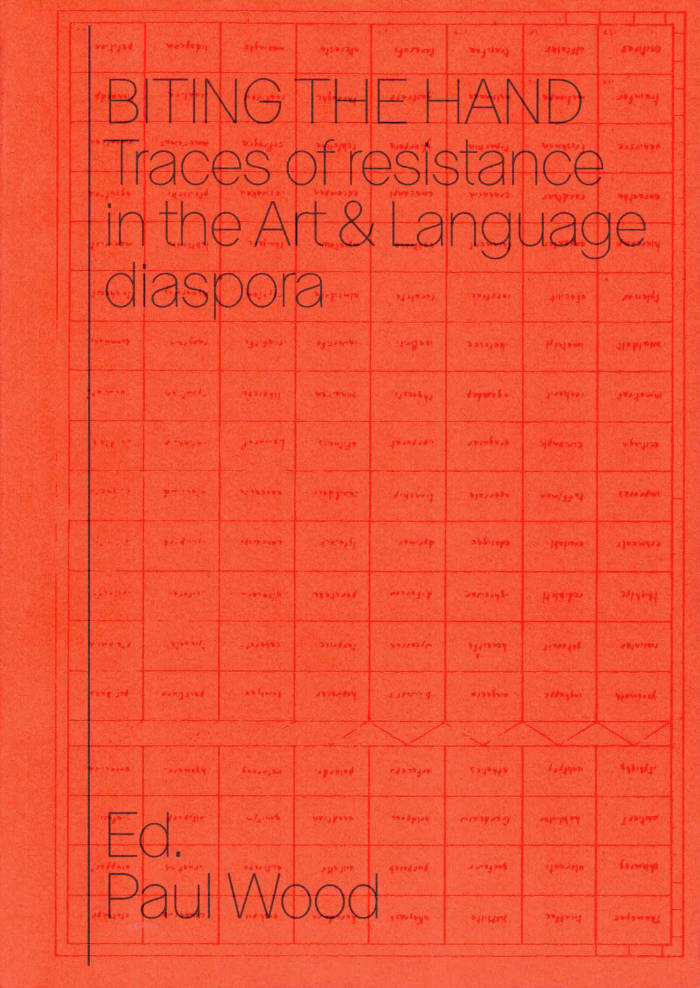
Biting the Hand – Traces of Resistance in the Art & Language diaspora
Extensive survey of the politically outward-looking Conceptualism emerging from Art & Language in the UK. Especially considering its critique of the norms of Modernist art practices in contemporary art, particularly practices of art education.
Edited, compiled and introduced by Paul Wood, Biting the Hand: Traces of Resistance in the Art & Language diaspora is about a dissident formation of artists active in the UK in the 1970s and 80s.
The book tells the story of artists engaging with a critique of then-contemporary modernist art education, who have embarked on a series of theoretical investigations which became increasingly politicised under the pressures of an evolving social crisis. Increased racism, unemployment and attacks on the organised working class all raised questions about how a critical art might respond.
By the late 1970s, these radical artists, mostly in the orbit of the Art & Language group, were producing posters and leaflets for a wide range of left-wing causes, as well as analyses of the politics of art and design education and the role of cultural ideology in maintaining consensus. In the 1980s, as Thatcherism tightened its grip, those involved went their separate ways into areas as diverse as media work, trade unionism, health and education.
Biting the Hand has three parts: a retrospective introduction setting the formation in its historical context, and two annotated documentary sections presenting examples of the work as both text and image, written and edited by Paul Wood.
It also includes a foreword by Sezgin Boynik, publisher, and an afterword by Ann Stephen, curator and art historian, further expanding on the book's subject.
For many years Paul Wood worked for the Art History Department of the Open University. His publications from that period include Conceptual Art (2000), Western Art and the Wider World (2013), and the four-volume anthology Art in Theory (1990-2020), co-edited with Charles Harrison and others.
Edited, compiled and introduced by Paul Wood.
Foreword by Sezgin Boynik; afterword by Ann Stephen.
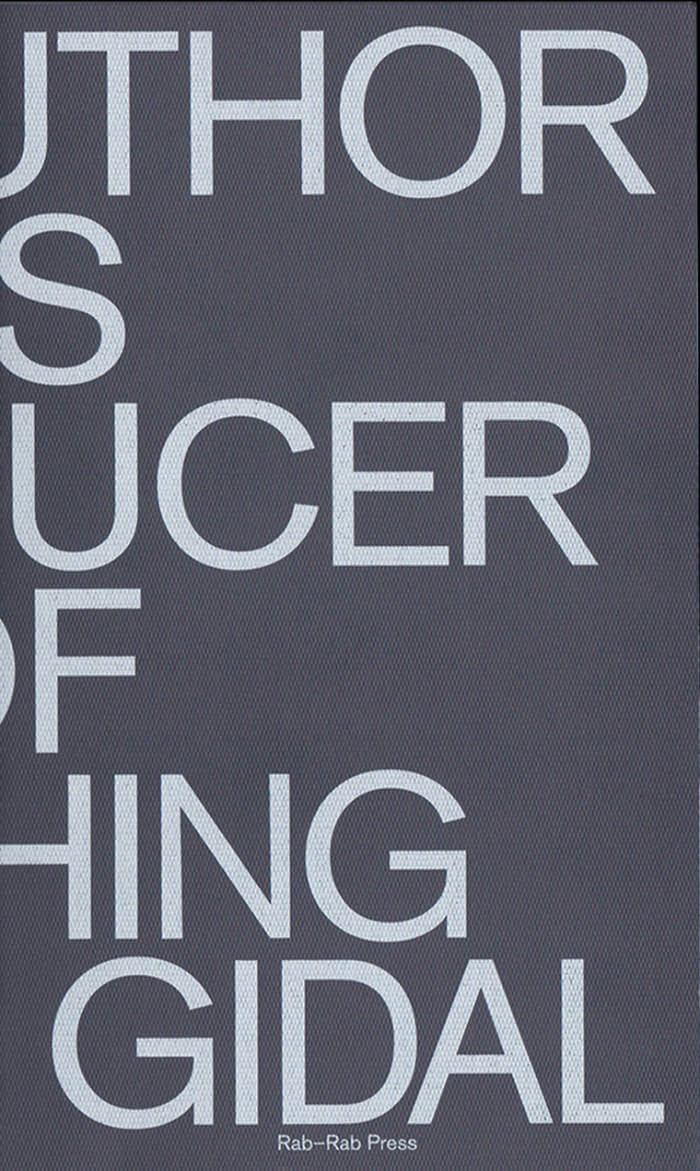
The Author as Producer of Nothing
The first publication of a lost 1978 text by Peter Gidal—one of the most influential experimental filmmakers ever.
The book includes the first publication of Peter Gidal's text from 1978, with a new introduction. Gidal in this dense theoretical essay deals with the limits of language and representation in the practice of experimental filmmaking and writing. Gidal's lost text The Author as Producer of Nothing will give a new insight into the theoretical and political context to experimental film practices.
The afterword by Sezgin Boynik discusses in detail the political contradictions of Gidal's filmic non-objectivity.
"The process of the film's making deals with devices that result in demystification or attempted demystification of the film process. But by 'deals with' I do not mean 'represents'. In other words, such films do not document various film procedures, which would place them in the same category as films which transparently document a narrative, a set of actions, etc. Documentation, through usage of the film medium as transparent, invisible, is exactly the same when the object being documented is some 'real event', some 'film procedure', some 'story', etc. An avant-garde film defined by its development towards increased materialism and materialist function does not represent, or document, anything. The film produces certain relations between segments, between what the camera is aimed at and the way that 'image' is presented. The dialectic of the film is established in that space of tension between materialist flatness, grain, light, movement, and the supposed reality that is represented. Consequently a continual attempt to destroy the illusion is necessary."—Peter Gidal
Peter Gidal (born 1946 in New York) is an influential British film theorist and avant-garde filmmaker, associated with the English "Structural/Materialist" movement (along with Malcolm Le Grice notably). He has published in numerous magazines (Studio International, Screen, October, Undercut) and is the author of several books, including Andy Warhol: Films and Paintings (1971), Materialist Film (1988) and Understanding Beckett: A Study of Monologue and Gesture in the Works of Samuel Beckett (1986).
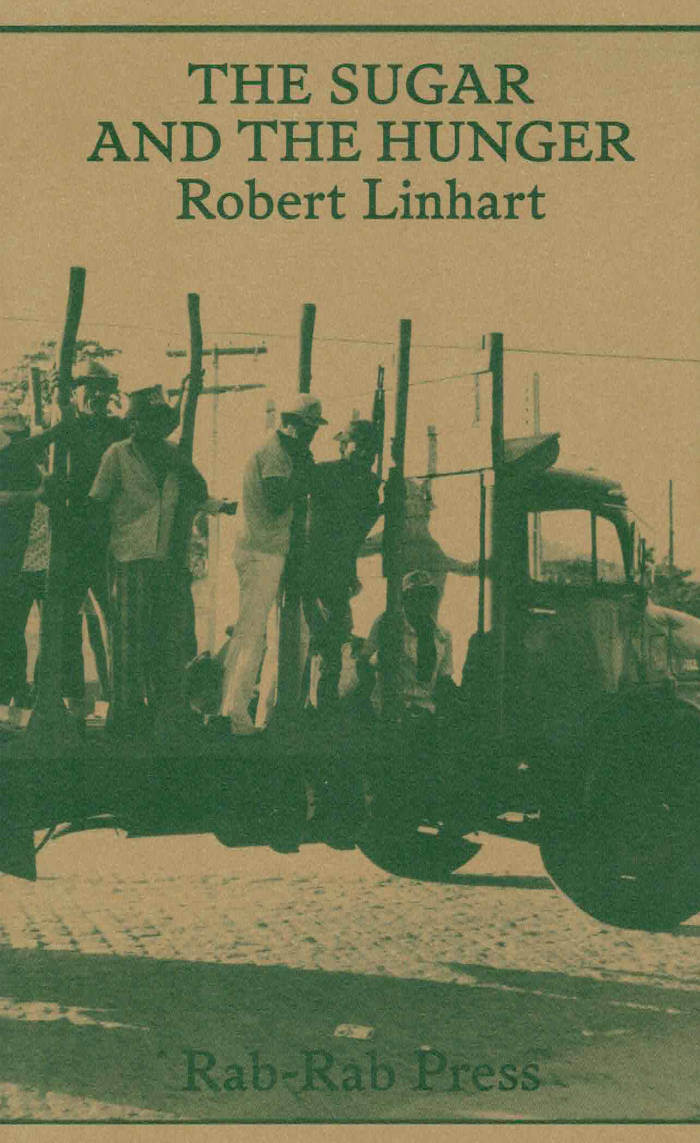
The Sugar and the Hunger
The first English language translation of Robert Linhart's The Sugar and the Hunger, originally published in 1980. Includes afterword by Luiz Renato Martins, and other materials.
Widely acclaimed for his engaged social analyses of proletariat and peasant struggles around the world, Linhart's inquiry into the sugar regions of North-Eastern Brazil, juxtaposes heterogeneous traits of the impoverished workers' stories into a vivid cinematic montage.
Alongside the translation, the book also includes 'The Third World, Investigations, Social Analysis', an unpublished interview with Linhart from 1980 made by Jean Copans, giving an insight into the political and theoretical background of his investigation in Brazil.
The afterword by Luiz Renato Martins, an active Brazilian Marxist art historian and journalist, further contextualises the importance of Linhart's book. Renato Martins who recently directed a documentary film Conversations With Robert Linhart discusses The Sugar and the Hunger against the backdrop of today's world where the practices of expropriation of land and food from peasants and urban poor, which Linhart examined in 1980 on a laboratory-like scale, have now become common global practices, endlessly producing legions of uprooted and hungry refugees.
Translated by John M Floyd and Emilio Sauri, the book includes rare photographs taken by François Manceaux in Northeastern Brazil in 1979.
Robert Linhart (born 1944 in Ixelles) is a French sociologist, philosopher and political activist, known as one of the founders of the Maoist movement in France, most famously for his 1978 autobiographic book L'Établi.

Wanting Something Completely Different – 111 Vignettes of Left-Wing Figures, Themes, Films, and Writers
A collection (montage) of biographies and themes written by Jairus Banaji.
Wanting Something Completely Different discusses a range of political figures, themes, directors and writers in a series of brief, evocative descriptions ('vignettes') aimed at laying out a vision of a modern, cosmopolitan left that can think creatively about the world we live in. The political figures include both thinkers and activists from a wide range of backgrounds—from Frantz Fanon and the Palestinian novelist Ghassan Kanafani to the theologian Dietrich Bonhoeffer and the murdered Russian journalist Anna Politkovskaya. The themes range equally widely from the death of Walter Benjamin (reconstructed here from a remarkable documentary on the same theme) and the slaying of Pasolini to the work of British Marxist Perry Anderson, or the corrupt nature of India's leading corporate groups, or the outstanding contributions of Italian and U.S. Black feminists to feminist theory. And under the rubrics which discuss film and literature, there is the same striving for diversity and depth.
The vignettes collected in this Rab-Rab book first circulated on Facebook over some seven years or more and are reproduced here with a new introduction and extensive bibliographical references and notes.
Jairus Banaji is a historian and revolutionary Marxist activist. He received the Isaac and Tamara Deutscher Memorial Prize in 2011. His academic work has ranged widely across sources and languages, with major books on Late Antiquity and commercial capitalism as well as numerous papers and articles.
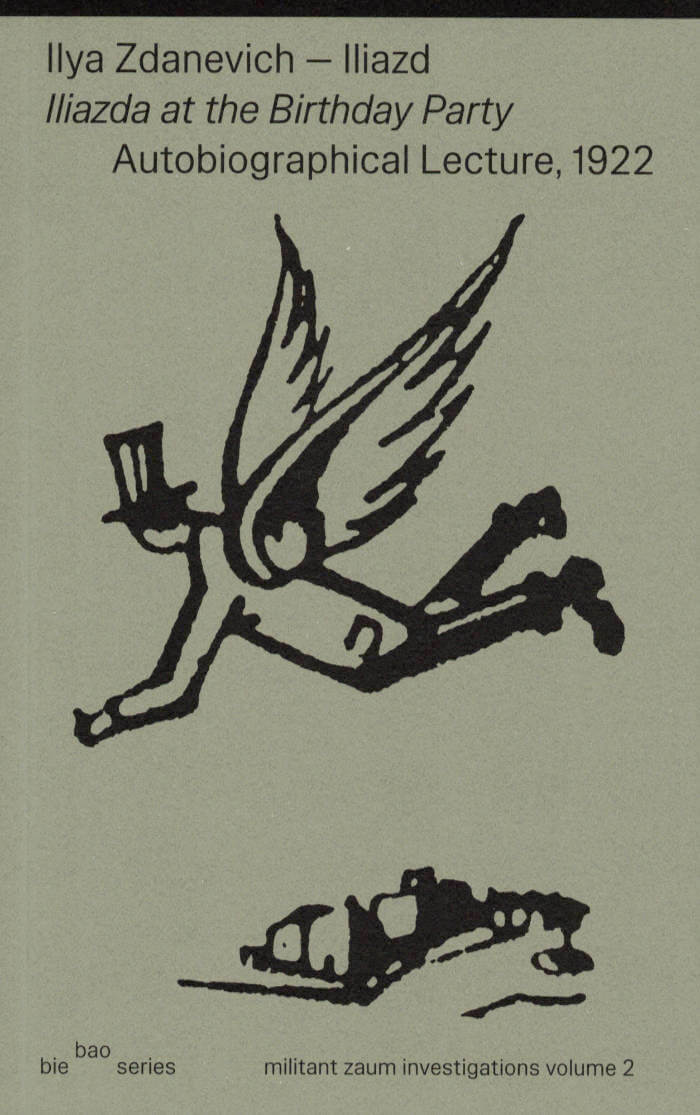
Iliazda at the Birthday Party – Autobiographical Lecture, 1922
The English translation of Zdanevich's Dadaist autobiographical lecture in Paris in 1922, where he adopts the name Iliazda. In this entertaining lecture, the achievements of the avant-garde is presented as a combination of zaum, polymorphous sexuality, aleatory forms and scatological interpretation of culture.
The second volume of the bie bao series presents a eulogy entitled Iliazda at the Birthday Party, a pseudo-autobiographical lecture delivered by Ilya Zdanevich in Paris in 1922. It reports on Zdanevich's artistic and political adventures up until then. Along with an autobiography full of self-admiration, in this lecture Zdanevich gives an interpretation of his zaum dramas inspired by Freudianism, and humorously describes a colourful image of the Russian microcosm in Montparnasse.
Additionally, this second volume also includes Iliazd's letter to Ardengo Soffici from 1964, where one can read, in the most unambiguous terms, about Zdanevich's positions against war, imperialism, and all forms of nationalism. Subtitled 50 Years of Russian Futurism, the letter to Soffici presents us with an altogether new Zdanevich—a "fellow traveller" in both leftist and avant-garde circles. As well as the extended introduction and extensive annotations, the texts are further contextualised with Johanna Drucker's visual presentation of the birth of the Iliazd cult.
The bie bao series will include eight publications, covering many layers of Zdanevich's rich theoretical and artistic output. Each volume consists of a bio-bibliographical introduction, a commentary, a translation with annotations, and artistic intervention.
Iliazd (Ilya Zdanevich, 1894-1975) was a Russian poet, designer, typographer, theoretician, art critic, and publisher, close to the avant-garde circles and one of the promoters of Futurism in Russia, author of a poetic work, drama written in zaum abstract poetic trans-sense or "transrational" language, and novels.
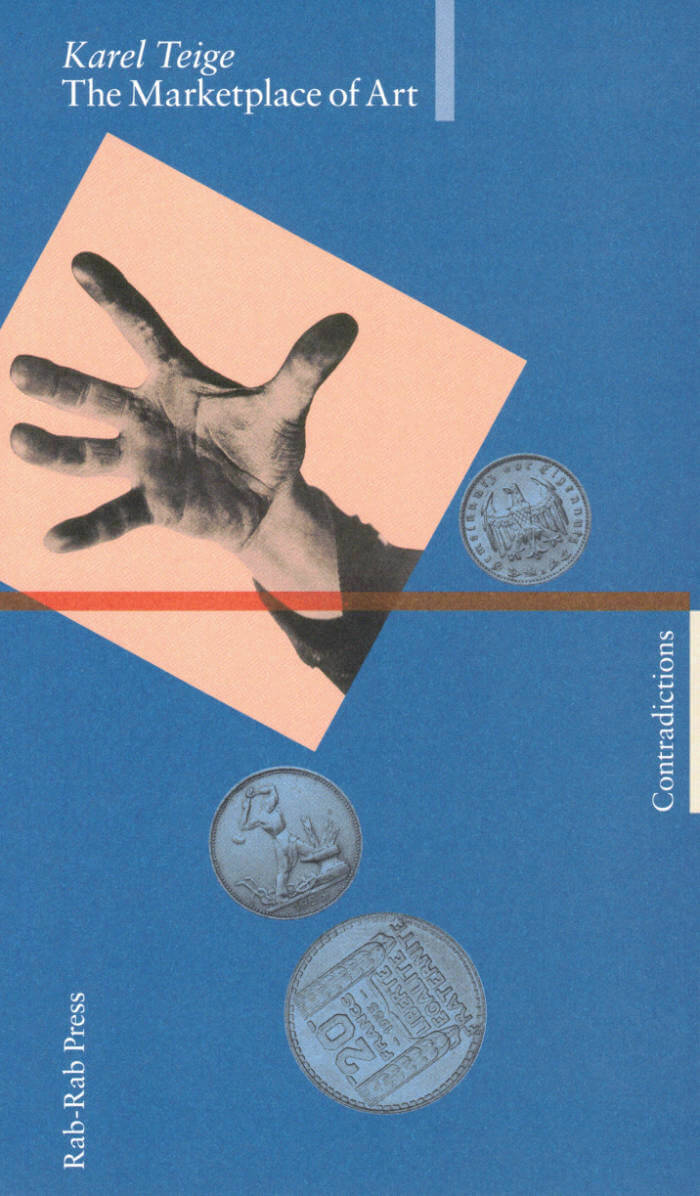
The Marketplace of Art / Commentary
The first English translation of Karel Teige's The Marketplace of Art in two volumes includes a critical introduction, inquiries, and extensive commentaries. Originally published in the Czech language in 1936, The Marketplace of Art is the summation of Teige's artistic, political, and theoretical work.
Acclaimed as one of the leading theoreticians of avant-garde art and architecture between the two world wars, Teige's more political writings still remain to be discovered. Written in 1936, in the context of the rising conservative right-wing culture, and during the intense debates between the avant-garde artists and the Communist Party, The Marketplace of Art is a response to the capitulation of contemporary art to fascist and Stalinist currents. Teige discusses this reaction as something deeply inscribed into the culture of the bourgeoisie, which he claims is a culture "not able to create and inspire any other kind of art besides a hollow and pompous academism or sentimental kitsch." Teige's Marxist analysis of the art market shows in which way this culture is tied with capitalist institutions and he offers artistic and political strategies to oppose its absolutism. In today's warmongering culture of authoritarian neoliberalism where the contemporary art market is run by oligarchs, Karel Teige's radical critique of the art market is more relevant than ever.
Rab-Rab Press presents this long-awaited translation with an accompanying volume of commentaries and interventions. Edited and introduced by Sezgin Boynik and Joseph Grim Feinberg, the book is published in collaboration with Contradictions/Kontradikce Journal based in Prague. The commentary volume includes commissioned essays by Zbyněk Baladrán, Dave Beech, Jana Ndiaye Berankova, Michel Chevalier, Esther Leslie, John Roberts, and Paul Wood, as well as an inquiry on The Marketplace of Art with responses from František Dryje, Tomáš Hříbek, Rea Michalová, Šimon Svěrák, and Roman Telerovský.
Czech artist, critic, and art theorist Karel Teige (1900-1951), close to the French Surrealists, founder of the Devětsil group in 1920, and member of Leva Fronta (The Left Front), was one of the most important figures of the Czech avant-garde.
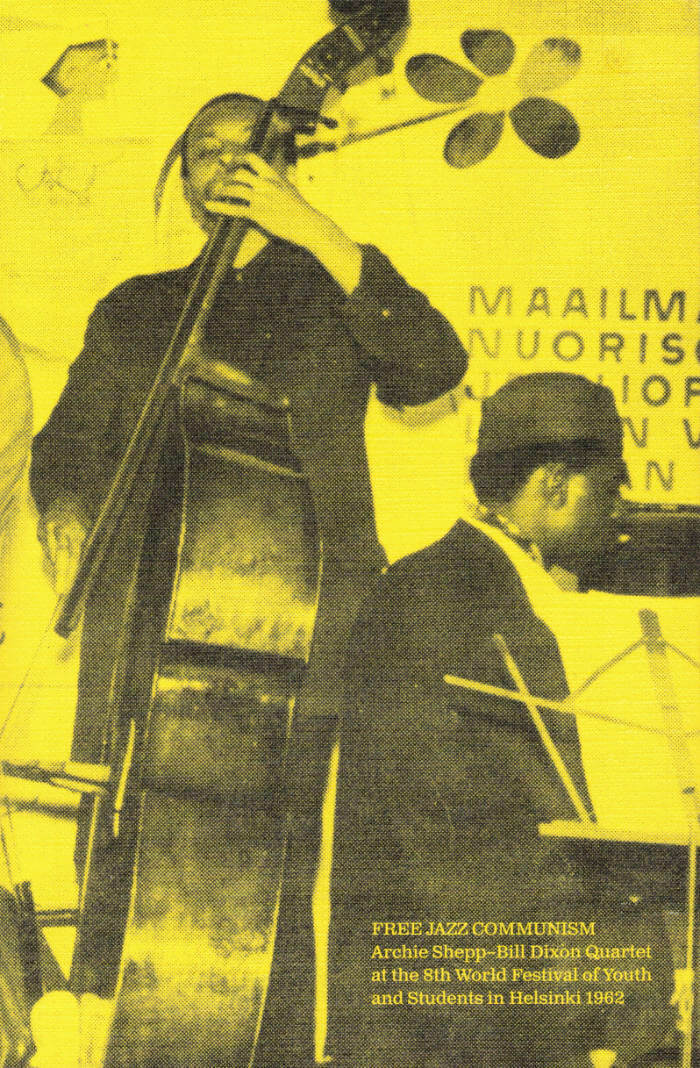
Free Jazz Communism
Sezgin Boynik, Taneli Viitahuhta
Actualising the concert of Archie Shepp–Bill Dixon Quartet at the 8th World Festival of Youth and Students in Helsinki 1962, Free Jazz Communismcontextualizes the politics of free jazz music in light of global decolonisation movements, anti-war activism, structures of racial capitalism, and forms of avant-garde music.
Apart from the theoretical and historical overview by its editors Sezgin Boynik and Taneli Viitahuhta, the book includes testimonies of the collective and international spirit of the 1962 Youth Festival, translated documents from the Finnish press, a new interview with Archie Shepp, commissioned text by Jeff Schwartz on the historical context of political engagement of free jazz musicians, and reproduction of three hard-to-find texts by Shepp. The new edition of Free Jazz Communismalso includes the reprint of the entire script of Archie Shepp's play The Communist (Junebug Graduates Tonight: A Jazz Allegory).

From Scratch – Albanian Summer Picaresque
Dave Smith, Jan Steele and 1 more
An account of an album about Albania by British experimental musicians made in the eighties. Also involving stories about the Albanian Society, William Bland, A. L. lloyd, RCPB ML, and Cornelius Cardew.
From Scratch is a story of Albanian Summer: An Entertainment, an LP album released by Practical Music in London in 1984. The album was composed by Dave Smith—English experimental composer and musician, figure of the British minimalist scene, explorer of Javanese and Albanian musical traditions with the English Gamelan Orchestra and Liria which he co-founded, and a member of The Scratch Orchestra (with Brian Eno, Cornelius Cardew, John Tilbury, Keith Rowe, Michael Nyman, Michael Parsons, etc.)—, and performed by Janet Sherbourne and Jan Steele, improvised and classical musicians.
Through interviews, archival materials, and hard-to-find essays the publication contextualizes the background of British experimental musicians' interest in socialist Albania. It includes new interviews with Dave Smith and Jan Steele, three essays by Smith on Albanian music and culture, an essay by Gavin Bryars on Smith's music, discussions on the influence of A.L. Lloyd and Cornelius Cardew, and the role of the Albanian Society in the UK. The book introduces new insight into the leftist internationalist background of British experimental music influenced by the work of Cardew.
Apart from the musical internationalism, the book also includes a section of nine abstract slogans depicting the political and artistic contradictions of socialist Albania; annotated bibliography of books published in different languages on Albania; the collection of images taken from the biweekly Zëri i Rinisë (The Voice of Youth) published in 1984 and 1985.